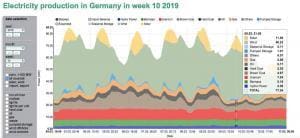Germany’s 2040 target of 65 per cent renewable electricity generation is looking more and more achievable, with the EU nation managing to hit 64.8 per cent just this month, in the week ending March 10.
The bulk of renewable generation over that period came from wind (48.4 per cent), with solar contributing 5.1 per cent, biomass 7.6 per cent and hydro 3.5 per cent.
Worth noting is that the amount of wind power generated throughout the week at no time dipped below the maximum output of either nuclear of brown coal.
Nuclear power in Germany is due to be phased out by 2022, while brown coal will be phased out by 2038.
Germany has a 35 per cent renewable energy target for 2020 but has already exceeded that. In 2018, it generated 40 per cent from renewables and so far this year it has sourced 43 per cent of its gross electricity production from renewables.

Hi,
Can you please advise if there is a way to install solar panels on an existing house. with wiring from power points
being able to use solar power direct and fall back to grid power if needed.
e.g at the moment peak power is say 28.47c/kwh excl gst. So I want to be able to use certain appliances in my house while solar is being produced. e.g washing machine etc. and I am not wanting to put electricity back into the grid.
Is this possible. To set up certain power points that use the solar power first and then grid power if the solar produced power is not available. For this set up would I still need an inverter?
Thanks interested in your feedback.
Michelle
Hi Michelle,
There’s a few questions there.
1. Solar PV is typically connected into your main switchboard and solar energy is used as a priority. So your solar power would be used first and any extra energy required would be pulled from the grid.
2. If you don’t want to send any electricity back to the grid, your inverter could be configured to achieve this. Although you can likely earn some money for surplus energy your system creates via a feed in tariff (see the feed in tariff section of Solar Choice website)
3. Yes you would still need an inverter. Solar panels create DC power that needs to be transformed via an inverter to AC Power to be usable in your house.
Thanks
SC Team